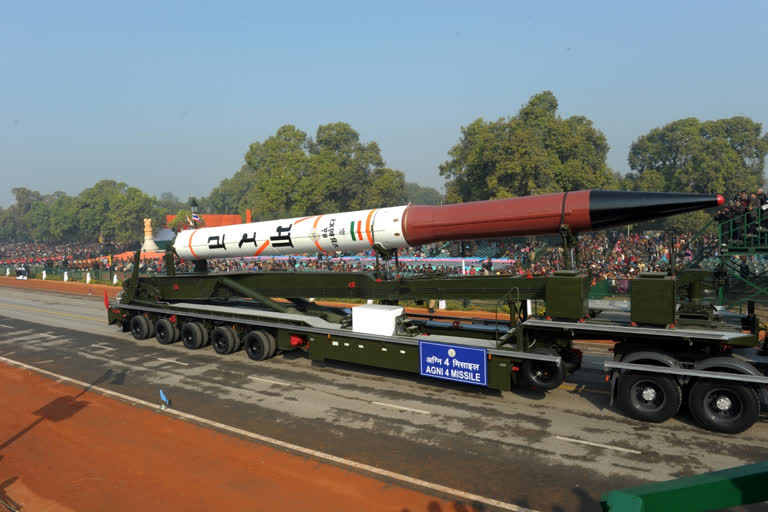Hyderabad (Telangana): While hinting at a shift in its nuclear weapons doctrine, Defence Minister Rajnath Singh on Friday said that the 'No First Use' (NFU) nuclear policy that India follows depends on the "circumstances in the future".
Singh, who was was at an event in Pokhran in Rajasthan - the site of India’s nuclear tests in 1998 - to pay homage to former Prime Minister Atal Bihari Vajpayee on his first death anniversary, said, "the government firmly stands by its 'No First Use' policy. What happens in future will depend on the circumstances,"
He reiterated his stand on NFU in a tweet that he posted later on.
"Pokhran is the area which witnessed Atal Ji’s firm resolve to make India a nuclear power and yet remain firmly committed to the doctrine of ‘No First Use’. India has strictly adhered to this doctrine. What happens in future depends on the circumstances, " he tweeted.
Singh's statement comes at a time when there is heightened tensions between India and Pakistan in the wake of the Bharatiya Janta Party-led Central government's decision to modify Article 370- which guaranteed special status to Jammu and Kashmir - and bifurcate the state into two Union Territories.
Pakistan has been raising its objection to the Indian government's action in Kashmir. Imran Khan, the Prime Minister of Pakistan even downgraded diplomatic relations with India, sent out emissaries to the UN, China and grouping of Islamic countries - Organisation of Islamic Cooperation (OIC) - in order to up its ante against India, and warned of another Pulwama kind of terror incident.
Forty Indian soldiers had died in a suicide attack on a convoy of the Central Reserve Police Force in February this year.
- Revocation of NFU on BJP's agenda\
This is not the first time in the last few years that BJP leaders have insinuated changes in the countries nuclear policy.
In November 2016, then Defence Minister Manohar Parrikar - who died last year - had remarked that he did not see why India had bound itself to a “no first use” policy on nuclear policy.
After his comments drew flak, a defence ministry spokesperson clarified to the press that the comments were Parrikar’s personal opinion.
More recently, Lieutenant General BS Nagpal, the former commander-in-chief of the Strategic Forces Command, is reported to have said that the No First Use policy was a ''formula for disaster.''
The BJP's 2014 election manifesto included a promise to "revise and update India's nuclear doctrine to make it relevant to challenges of current times."
But while campaigning for the same election, Prime Minister Narendra Modi had dismissed a question on scrapping the 'No First Use' policy in an interview to news agency. "No first use was a great initiative of Atal Bihari Vajpayee - there is no compromise on that. We are very clear. No first use is a reflection of our cultural inheritance," he had said in April 2014, on the verge of an election in which he stormed to power.
- What is NFU and when did it come about?
India adopted the “No First Use,” or NFU policy in 1998 after the country’s first nuclear weapons were publicly tested in Pokhran.
NFU is a pledge which requires a country to ensure that it would not be the first to use nuclear weapons in case of a conflict.
The nuclear policy was adopted by the National Democratic Alliance government, led by the then Prime Minister Atal Bihari Vajpayee.
India’s nuclear doctrine, which includes NFU, further states that the country’s nuclear arsenal is meant to deter the use and threat of nuclear force against it and that it would not employ its weapons against a non-nuclear state.
But, the neighbouring Pakistan does not have a "No First Use" policy.
- Comparison between India and Pakistan's nuclear policies and capabilities A table on Nuclear world forces as per SIPRI report 2019
It is believed that India initiated its nuclear weapons development as early as 1962, following a brief border war with China.
In an interview with Manchester Guardian, Zulfikar Ali Bhutto, architect of Pakistan's atomic programme, said, “If India builds the bomb, we will eat grass or leaves, even go hungry – but we will get one of our own.”
Pakistan began to prioritise its own nuclear weapons development programme following the Indo-Pak war of 1971, in which it lost nearly half of its territory – East Pakistan becoming independent Bangladesh.
Although India is far ahead in terms of conventional (non-nuclear) military force when compared to Pakistan, with the main difference being that India possesses a nuclear triad - the ability to launch nuclear strikes by air, land and sea- while Pakistan is still working on the seafront.
India, in 2018, operationalised its “INS Arihant” nuclear-powered ballistic missile submarine, making it one of only six nations in the world with this capability. Pakistan has tested several sea-launched missiles.
The Stockholm International Peace Research Institute, which compiles data on conflict and arms control, estimates that India currently has between 130 and 140 warheads, while Pakistan has between 140 and 150.
Pakistan's missiles are longer-range, including the Shaheen-3 missile, capable of striking India’s far-flung Andaman Islands.
The two neighbouring countries, however, have comparable nuclear arsenals, as both are capable of causing massive damage to one another by hitting critical centres and causing massive loss of life.
India also has concerns about China, which has a bigger military and more advanced strategic weapons.
India ranks 4th among 137 countries in terms of Global Fire Power (GFP) while Pakistan ranks 15th.
